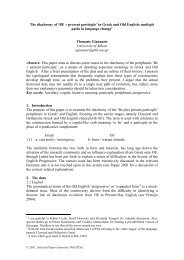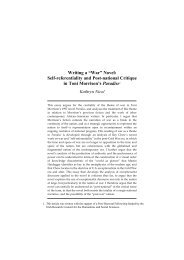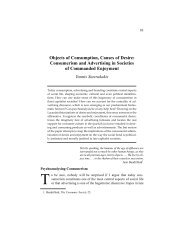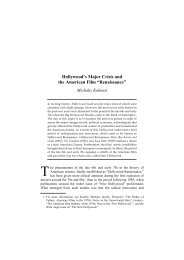19 International Symposium on Theoretical and Applied Linguistics ...
19 International Symposium on Theoretical and Applied Linguistics ...
19 International Symposium on Theoretical and Applied Linguistics ...
You also want an ePaper? Increase the reach of your titles
YUMPU automatically turns print PDFs into web optimized ePapers that Google loves.
G E N E R A L S E S S I O N<br />
Alexiadou, A. 2007. On the role of syntactic locality in morphological processes: the case of (Greek) derived<br />
nominals. To appear.<br />
Alexiadou, A. <strong>and</strong> E. Anagnostopoulou. 2008. Structuring Participles. In C. B. Chang & H. J. Haynie (eds.)<br />
Proceedings of the 26th West Coast C<strong>on</strong>ference <strong>on</strong> Formal <strong>Linguistics</strong> 33-41.<br />
Anagnostopoulou, E. 2003. Participles <strong>and</strong> Voice. In A. Alexiadou, M. Rathert & A. v<strong>on</strong> Stechow (eds.) Perfect<br />
Explorati<strong>on</strong>s 1-36. Berlin/ New York: Mout<strong>on</strong> de Gruyter.<br />
Borer, H. 2008a. Compounds: The view from Hebrew. To appear.<br />
Borer, H. 2008b. Notes for Late Inserti<strong>on</strong>. Paper presented at WCCFL XXVII, UCLA.<br />
Borer, H. 2003. Exo-skeletal vs. endo-skeletal explanati<strong>on</strong>: Syntactic projecti<strong>on</strong> <strong>and</strong> the lexic<strong>on</strong>. In J. Moore & M.<br />
Polinsky, eds. The Nature of Explanati<strong>on</strong> in Linguistic Theory. Stanford: CSLI.<br />
Marantz, A. Phases <strong>and</strong> Words. Ms. NYU. To appear.<br />
Marantz, A. 2001. Words <strong>and</strong> things. Ms. MIT.<br />
Vocabulary interacti<strong>on</strong> am<strong>on</strong>g the three languages of trilingual children<br />
1 Georgia Andreou & 2 Foteini Anastasiou<br />
1&2 University of Thessaly<br />
1 <strong>and</strong>reou@uth.gr & 2 rzc_foteini@hotmail.com<br />
Trilingualism/ multilingualism is a field of study that has mostly emerged during the last decade <strong>and</strong> it<br />
keeps gaining ground. Its significance to our knowledge of language mechanisms is such that has<br />
attracted the interest of several subfields of linguistics, i.e. psycholinguistics, sociolinguistics, clinical<br />
linguistics, as well as neurolinguistics.<br />
Greece has been a country that has welcomed a vast number of immigrants from different origins.<br />
Therefore, the immigrants’ children, now living <strong>and</strong> being schooled in Greece, present a huge scientific<br />
interest since they speak their mother t<strong>on</strong>gue (L1), Greek (L2) <strong>and</strong> English (L3). In most cases these<br />
children’s languages are not typologically related, thus adding up an extra element to trilingual<br />
research.<br />
Research in the field of trilingualism in Greece is rather scarce, if any. This study will focus <strong>on</strong><br />
vocabulary interacti<strong>on</strong> am<strong>on</strong>g the three languages of trilingual children in Greece. It will be held with<br />
children studying in minority Greek state schools.<br />
The noti<strong>on</strong> that multilinguals are nowadays more than bilinguals (Tucker, <str<strong>on</strong>g>19</str<strong>on</strong>g>98) points us out the<br />
importance of knowledge <strong>on</strong> the choices multilinguals make when they speak or use <strong>on</strong>e of their<br />
languages, the way they code switch <strong>and</strong> the methods they implement every time they need to<br />
orchestrate their speech. In our case these multilinguals/ trilinguals are even more interesting since<br />
they are young learners in all of their three languages <strong>and</strong> the data collected will help us to<br />
comprehend the interacti<strong>on</strong> of the languages in an early stage.<br />
We expect that our data will be of great help in future innovati<strong>on</strong>s that need to be d<strong>on</strong>e, as far as<br />
the Greek state school educati<strong>on</strong> system is c<strong>on</strong>cerned. The issue of trilingualism in Greek schools<br />
presents a new reality that needs to be addressed so<strong>on</strong> enough, since an efficient <strong>and</strong> productive<br />
educati<strong>on</strong> system has to be able to adjust to every new challenge.<br />
Bibliography<br />
Tucker, G. R. (<str<strong>on</strong>g>19</str<strong>on</strong>g>98) A global perspective <strong>on</strong> multilingualism <strong>and</strong> multilingual educati<strong>on</strong> In J. Cenoz <strong>and</strong> F.<br />
Genesee (eds) Bey<strong>on</strong>d Bilingualism: Multilingualism <strong>and</strong> Multilingual Educati<strong>on</strong> (pp. 3-15). Cleved<strong>on</strong>: Multilingual<br />
Matters.<br />
Sec<strong>on</strong>d Language (L2) learning by dyslexics<br />
1 Georgia Andreou & 2 Julie Baseki<br />
1&2 University of Thessaly<br />
1 <strong>and</strong>reou@uth.gr & 2 juliepbaseki@hotmail.com<br />
The study of foreign language learning for dyslexics that have found learning to read <strong>and</strong> write in their<br />
first language extremely problematic has been an under-researched area throughout the world.<br />
According to Crombie (2000: 114) there are a number of problems associated with dyslexia that<br />
seem likely to affect the learning of languages. They include weakness in ph<strong>on</strong>ological processing,<br />
poor working memory, poor auditory discriminati<strong>on</strong>, c<strong>on</strong>fusi<strong>on</strong> over syntax, faulty auditory sequencing,<br />
poor self-esteem, difficulties with motor skill <strong>and</strong> automaticity, poor organizati<strong>on</strong>al skills, slow speed of<br />
informati<strong>on</strong> processing, difficulties in object naming <strong>and</strong> limited attenti<strong>on</strong> span.<br />
<str<strong>on</strong>g>19</str<strong>on</strong>g> th ISTAL 5






